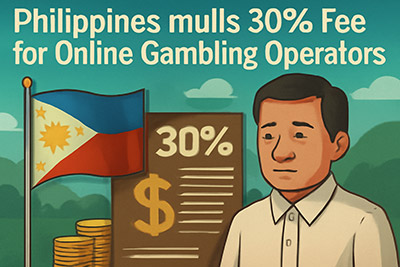 The Philippine government is currently considering significant regulatory changes for its online gambling sector, including increasing license fees and implementing stricter oversight measures. Finance Secretary Ralph Recto has proposed raising the license fee on online gambling operators to as high as 40%, signaling a shift in the government’s approach to managing the sector.
The Philippine government is currently considering significant regulatory changes for its online gambling sector, including increasing license fees and implementing stricter oversight measures. Finance Secretary Ralph Recto has proposed raising the license fee on online gambling operators to as high as 40%, signaling a shift in the government’s approach to managing the sector.
Proposal for Increased Licensing Fees
At a Post-State of the Nation Address (SONA) event in San Juan City, Recto floated the possibility of hiking the current 25% licensing fee to between 30% and 40%. This proposal, which is still under discussion, is part of a broader regulatory review, especially as online gambling continues to expand rapidly in the Philippines. Recto acknowledged that if the fees were set too high, there could be unintended consequences, such as driving operators toward illegal activities. To address this, the Department of Finance (DOF) is working with the Philippine Amusement and Gaming Corporation (PAGCOR) to assess the potential impacts of such a fee increase.
At present, land-based casinos offering online gambling services are subject to a reduced fee of 25%, effective from January 2025. However, this lower rate applies only to integrated resorts that also offer physical gaming. The proposed fee hike would impact domestic electronic gaming platforms (e-games), which have become a rapidly growing segment of the market.
Growth of Online Gambling Revenue
The online gambling sector has seen impressive growth in recent years. According to PAGCOR data, in the first half of 2025, the Philippine gaming industry generated gross gaming revenue (GGR) of PHP 214.75 billion (€3.31 billion), marking a 26% increase from PHP 171 billion (€2.63 billion) in the same period in 2024. Electronic gaming, including e-games, e-bingo, and licensed bingo operations, led the industry’s growth, contributing PHP 114.83 billion (€1.77 billion), or 53.47% of total GGR. Meanwhile, licensed land-based casinos in various regions generated PHP 93.36 billion (€1.44 billion), and PAGCOR’s government-operated casinos accounted for PHP 6.56 billion (€101 million).
The sector’s strong performance highlights its growing dominance within the Philippine gaming industry. However, online gambling remains a contentious issue due to political, social, and moral concerns.
Political and Social Opposition
Despite the sector’s success, there is significant opposition from both political figures and the Catholic Church. Some lawmakers have proposed bills calling for tighter regulations or even a ban on online gambling, arguing that it harms vulnerable groups such as the poor and students. Gian Samson, a representative from PAGCOR’s employee association, has voiced support for a total ban on online gambling, stating, “It’s not contributing anything to our society, and it’s putting lives and savings at risk.” Cardinal Pablo Virgilio David of the Catholic Church also warned that gambling is a “moral and social crisis” that disproportionately affects vulnerable groups.
Despite this opposition, industry representatives argue that banning licensed platforms could push users toward illegal operators that operate without oversight or consumer protections. They also warn that such a move would result in lost jobs and reduced revenues for national development projects.
Mandatory Stock Exchange Listings
In addition to increasing taxes and licensing fees, the Philippine government is considering requiring online gambling operators to list on the Philippine Stock Exchange (PSE). Recto suggested that forcing operators to go public would increase transparency in the sector, helping to reveal the true ownership structures of gambling companies. By applying the same disclosure requirements to online gambling firms as publicly listed companies, the government hopes to ensure greater accountability and protect investors.
Publicly listed companies are required to disclose financials, ownership structures, and other material information regularly, providing investors with a clearer understanding of the company’s operations. This proposal would be a major shift for the online gambling sector, which has often been criticized for lacking transparency.
Industry Responses and the Future of Online Gambling
The online gambling industry has voiced concerns about the potential impact of these regulatory changes. DigiPlus Interactive, the operator behind platforms like BingoPlus and ArenaPlus, has expressed support for “smart, balanced regulation.” However, the company has cautioned that excessive taxation could harm legitimate businesses. DigiPlus recently faced a significant drop in its stock price, reflecting broader market unease over the regulatory environment.
In response to concerns about illegal gambling, PAGCOR has also taken steps to tighten control over gambling-related advertisements. The agency signed a memorandum of understanding with the Ad Standards Council to enhance oversight of such ads, and has ordered that all gambling advertisements in public spaces and on primetime television be removed by August 2025.
Stricter Regulations and Potential Industry Barriers
The government is also considering other reforms, such as limiting the use of e-wallets for gambling transactions. Recto has noted that the Philippines currently faces challenges with illegal gambling, with an estimated 60% of online gambling activity operating outside the regulated market. He emphasized the importance of regulating the sector to prevent the growth of illegal platforms, adding, “I am not in favor of gambling. My advice: do not gamble. But if people do, we’d rather regulate it than have them resort to illegal operations.”
The debate over stricter regulations and increased taxation is complicated by the broader economic context. The Philippines aims to collect over PHP 200 billion ($3.42 billion) in gambling-related revenues in 2025, split evenly between land-based and online gambling operations. Critics, however, warn that additional financial burdens could push operators into grey or illegal markets, undermining efforts to regulate the industry.
Conclusion: A Crossroads for Philippine Online Gambling
As the Philippines continues to explore regulatory changes, including higher taxes, mandatory stock exchange listings, and greater oversight, the future of the online gambling sector remains uncertain. While the industry has proven to be a significant revenue generator, the government must carefully balance the potential for growth with the need for transparency, responsible regulation, and the protection of vulnerable groups.
Sources:
Philippine government mulls increasing online gambling license fee to up to 40%, agbrief.com, July 29, 2025
More Information & Source
Original Source:
Visit Original Website
Read Full News:
Click Here to Read More
Have questions or feedback?
Contact Us


